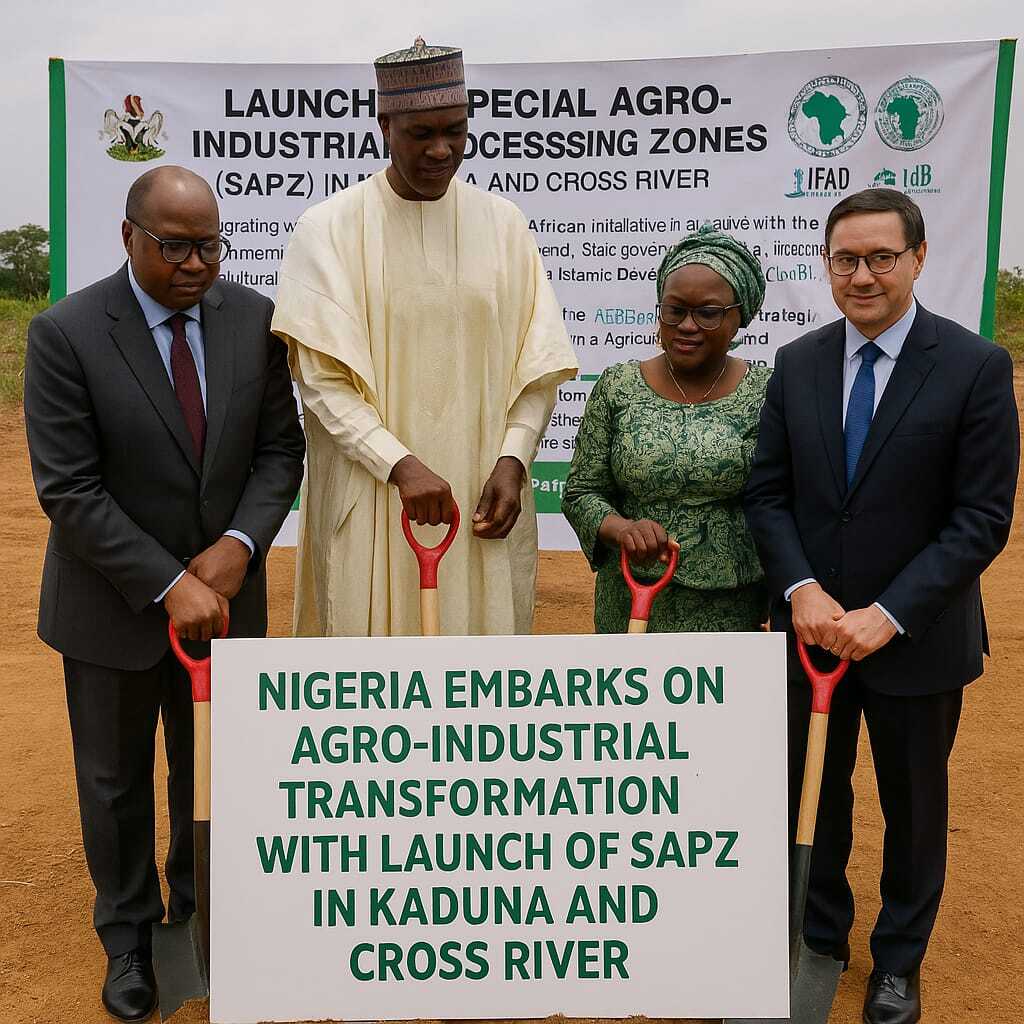Nigeria Embarks on Agro-Industrial Transformation with Launch of SAPZ in Kaduna and Cross River
Nigeria has launched a transformative agricultural development initiative with the groundbreaking of Special Agro-Industrial Processing Zones (SAPZ) in Kaduna and Cross River states. This marks a major milestone in the country’s efforts to revolutionize its agricultural value chain, attract private sector investment, and create jobs across rural communities.
The SAPZ initiative is being spearheaded by the African Development Bank Group (AfDB) in collaboration with the Federal Government of Nigeria, state governments, the International Fund for Agricultural Development (IFAD), and the Islamic Development Bank (IsDB). The project aligns with AfDB’s Feed Africa strategy, which seeks to transform African agriculture into a sustainable and globally competitive sector.
What Are SAPZs?
Special Agro-Industrial Processing Zones are designated areas with the right infrastructure and policy support to attract agri-businesses and agro-industries. The goal is to move agricultural production beyond subsistence farming, enabling value addition through processing, packaging, and distribution — essentially creating agri-based industrial hubs that reduce post-harvest losses and increase farmers’ income.
The zones will be equipped with:
- Rural roads and logistics hubs
- Storage and cold chain facilities
- Reliable energy and water infrastructure
- Processing and packaging industries
- Training and technical support centers
Kaduna and Cross River: The First Movers
In Kaduna, the SAPZ will focus on key value chains such as dairy, maize, tomatoes, and ginger, leveraging the state’s agricultural potential. The state has already begun engaging private investors to develop processing plants for dairy and tomatoes.
In Cross River, the SAPZ targets cassava, cocoa, rice, and oil palm — all crops with strong domestic and export market potential. Governor Bassey Otu described the SAPZ as a “game-changer” for youth employment and rural development.
National Impact and Long-Term Vision
When fully operational, the SAPZ program is expected to:
- Create over 1.5 million jobs nationwide (direct and indirect)
- Catalyze $1 billion in private sector investments
- Boost food security and reduce reliance on imports
- Empower smallholder farmers, particularly women and youth
- Foster inclusive rural industrialization and poverty reduction
AfDB President Dr. Akinwumi Adesina emphasized during the launch that SAPZs will “turn rural Nigeria into zones of economic prosperity” and ensure that agriculture becomes a business, not a development activity.
The Federal Ministry of Agriculture and Food Security has committed to rolling out SAPZs in 24 states, with Phase 1 targeting seven states and the Federal Capital Territory (FCT). Other pilot states include Kano, Kwara, Ogun, Imo, and Oyo.
Global Partnerships and Funding
The total investment for Phase 1 of Nigeria’s SAPZ is $538 million, with funding from:
- AfDB: $210 million
- IFAD: $160 million
- IsDB: $150 million
- Federal and state governments: $18 million
These investments will be complemented by private sector participation, with major agri-business firms like Olam, Flour Mills of Nigeria, and Dangote Group already showing interest.
Nigeria’s agro-industrial transformation, anchored by SAPZs, is poised to redefine the landscape of African agriculture. By linking farmers to markets and scaling up value-added production, the country aims to become a regional agricultural powerhouse while ensuring food security, employment, and economic growth for its people.
Follow & Subscribe:
👉 Africa Agri Market on LinkedIn for the latest updates and insights.
🌐 Visit us at www.africa-agri-market.com for more information!
